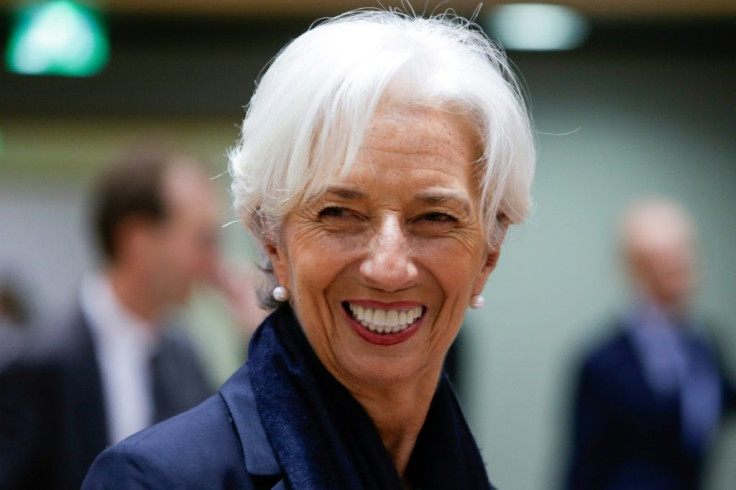In First Big Speech, ECB's Lagarde Tells Europe To 'Innovate And Invest'

Christine Lagarde on Friday urged European countries to "innovate and invest" more to support growth at a time of global uncertainty, in her first major policy speech as president of the European Central Bank.
The ECB's ultra-loose monetary policy would "achieve its goal faster and with fewer side effects" if euro area governments supported it with fiscal policy, Lagarde told a banking conference in Frankfurt.
The eurozone economy is expected to grow just 1.1 percent this year -- "much lower than previously forecast", she said, as "trade tensions and geopolitical uncertainties" take their toll.
"Europe needs to innovate and invest to respond to these challenges and preserve its competitiveness in the longer run," said Lagarde, whose previous job was head of the International Monetary Fund.
She called for an investment drive across the 19-nation currency bloc that should be "more productive, more digital and greener".
The speech by Lagarde, who took on her new role as the ECB's first female chief at the start of the month, was highly anticipated by markets keen for a hint of her future policy stance.
"For the time being, Lagarde meets the expectations that she could become the leading economic and political voice for Europe rather than quickly shaking up the ECB," said ING Diba bank analyst Carsten Brzeski.
Lagarde's comments echoed those by the Organisation for Economic Co-operation and Development (OECD) which had on Thursday likewise urged governments to loosen the purse strings.
Warning that the global economy was headed for its weakest economic growth "since the global financial crisis", it said governments had not invested enough to improve their long-term infrastructure, advance new technologies or combat climate change.
Hobbled by the US-China trade conflict and Brexit turmoil, the OECD now expects economic activity to grow at around 3.0 percent in 2020-2021 -- down from a 3.5 percent rate projected only a year ago.
Elsewhere on Friday, a closely watched survey by the firm IHS Markit found that the eurozone's economy was seen to have "near-stalled" in November after successive months of manufacturing decline.
In her speech, Lagarde homed in on the weakening manufacturing sector as she stressed the importance of strengthening domestic economies.
"We are starting to see a global shift -- driven mainly by emerging markets -- from external demand to domestic demand, from investment to consumption and from manufacturing to services," she told the Frankfurt audience.
Lagarde has previously suggested she would stick closely to predecessor Mario Draghi's accommodative monetary policy mix of cheap credit, record-low interest rates and massive bond purchases to stimulate the economy and drive up stubbornly low inflation.
But Lagarde, a lawyer and not an economist by training, has also pledged to make her mark with a push for more action on climate change, gender equality and making the ECB's language more jargon-free.
On Friday, the former French finance minister said she would launch "a strategic review" of the bank's monetary policies.
Lagarde's arrival at the ECB comes as its governing council was divided as never before over Draghi's final stimulus package in September.
The measures saw the bank restart a monthly government and corporate bond buying programme and cut a key rate deeper into negative territory.
But the measures drew howls of protest from some council members who said they were too heavy-handed and would deepen the pain for eurozone banks already struggling to make a profit amid historically low interest rates.
One of Lagarde's first orders of business as ECB president was to whisk the 25-member council away from the bank's glass-and-steel headquarters for a "retreat" in a plush hotel outside Frankfurt to heal the rift.
Lagarde will hold her maiden ECB press conference on December 12 after chairing her first governing council policy meeting.
© Copyright AFP 2024. All rights reserved.











